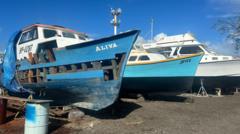In the heart of Bridgetown, the temporary boatyard tells a harrowing story of devastation left by Hurricane Beryl, which struck Barbados in July. The sight of numerous damaged fishing vessels, some with gaping holes and broken parts, illustrates the storm's merciless impact. To many, these wrecked boats represent not just property loss but a halt to livelihoods and traditions intertwined with the sea.
Charles Carter, a local fisherman whose boat Joyce has undergone extensive repairs, reflects on the ordeal. “It’s been real bad. I had to change both sides of the hull,” says Carter. Despite the financial burden of restoration, he hopes to return to the waters soon, emphasizing the deep ties between his identity and his craft. "Fishing is all I do." His sentiments resonate with Captain Euride, who waves his hand dismissively, stating, “The fishing industry is mash up.”
The statistics highlight the storm's impact starkly: 75% of the island's active fishing fleet saw damage, with 88 boats lost entirely. Even six months on, fishermen like Carter find themselves struggling to regain their footing, reliant on government assistance to help repair and replace their vessels. The sight of Joyce returning to the ocean brings a glimmer of hope amid ongoing challenges.
Yet the specter of climate change looms large over the fishermen of Barbados. This hurricane season was marked by the early arrival of what became the most intense storm on record, a concerning trend expected to worsen in the coming years. Chief Fisheries Officer Dr. Shelly Ann Cox acknowledges the issue: “Our captains have been reporting that sea conditions have changed,” she says, noting warmer waters and altered fish migration patterns.
The iconic flying fish, a staple of Barbadian culture and cuisine, is increasingly hard to find, creating ripples in the local economy including the tourism sector that heavily relies on marine resources. “Everything has changed. The tides are changing, the weather is changing,” laments local vendor Cornelius Carrington, who lost one of his fishing boats in the storm.
Efforts to forge an awareness of climate change's impact are gaining traction among the island’s youth. In a conversation at Harrison College, students express a mix of pessimism and hope about their island's future. “We are a very small country. No matter how hard we try to change, if the big countries don’t make a change, everything we do is going to be pointless,” says student Isabella Fredricks. Contrastingly, classmate Tenusha Ramsham emphasizes the power of collaboration and innovation in tackling these global challenges.
Barbados' Prime Minister Mia Mottley is also increasingly vocal on the world stage, urging developed nations to take responsibility for their contributions to climate change. As islanders confront an uncertain future, those like fisherman Steven Bourne illustrate the unwavering spirit of a community deeply connected to the land and sea. “We love this rock. And we will always be on this rock,” he says, embodying the resilience that will be necessary for Barbadians as they face ongoing environmental assaults.




















